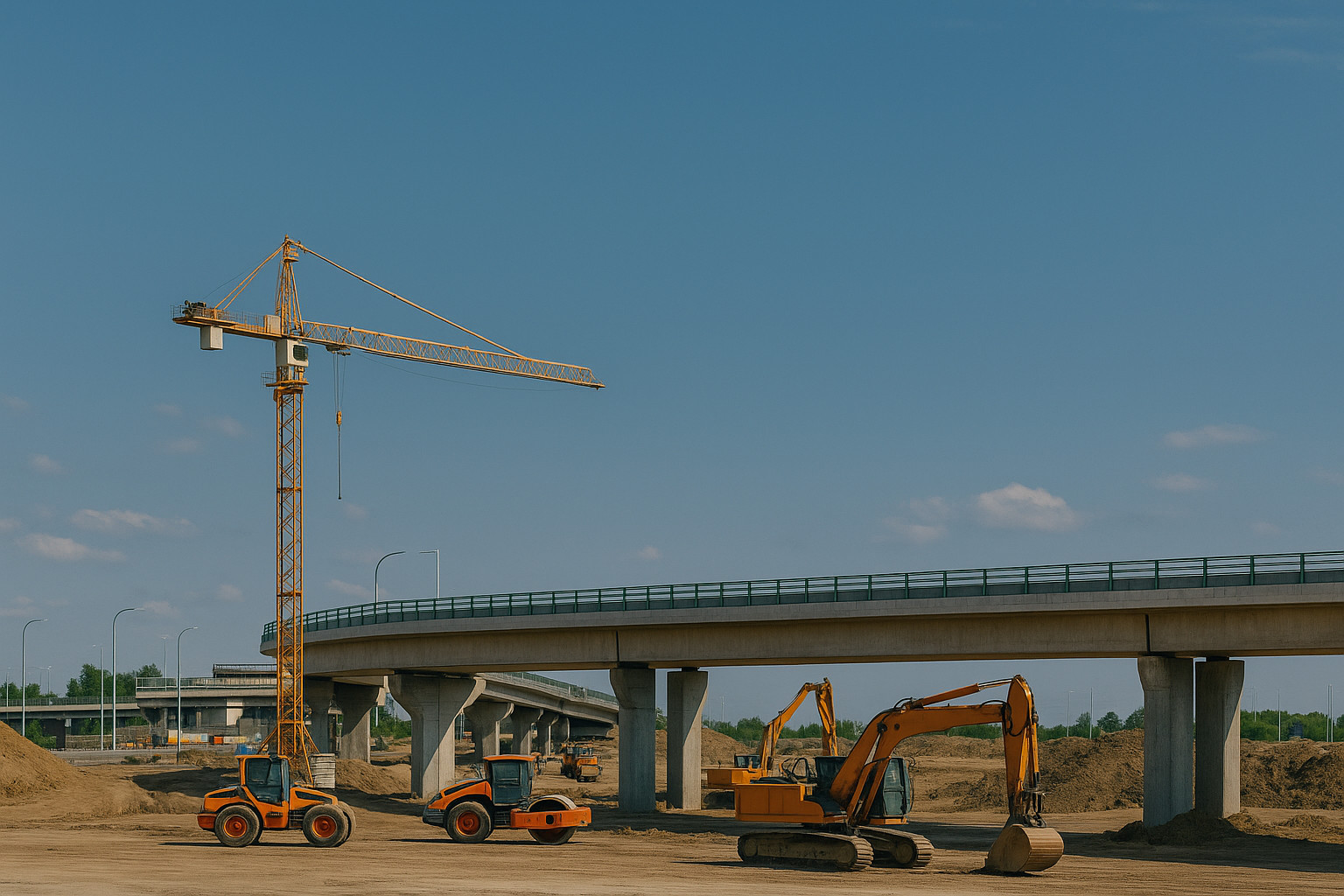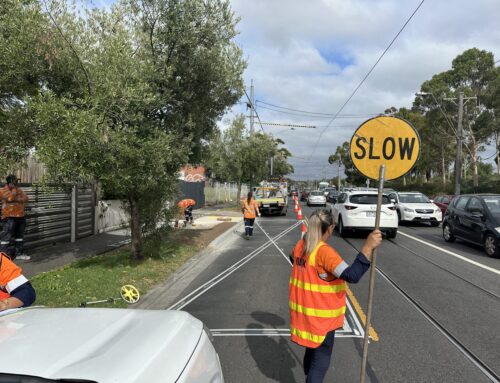Australia is entering one of its largest infrastructure investment phases, with more than $270 billion committed nationwide over the next decade. Victoria, in particular, is set to benefit from a significant share of this pipeline, covering transport upgrades, roadworks, rail expansion, and urban development projects. For civil contractors in Melbourne, this boom presents both opportunity and competition. From major projects like the Suburban Rail Loop to local road and drainage works, the surge in civil infrastructure development in Melbourne is reshaping the construction landscape and creating new pathways for contractors of all sizes.
The Scale of the $270B Infrastructure Boom
Australia’s infrastructure investment program is valued at over $270 billion, making it one of the largest in the nation’s history. A significant portion of this pipeline is directed towards Victoria, where population growth, housing demand, and economic expansion are driving the need for new civil works.
Key areas of investment include:
- Transport & Roads – Major upgrades such as the North East Link and West Gate Tunnel Project.
- Rail & Metro – Expansions like the Suburban Rail Loop and Melbourne Metro Tunnel.
- Utilities & Services – Water infrastructure, drainage, and power network upgrades.
- Urban Development – New residential estates, commercial hubs, and community facilities.
Below is a high-impact overview of how this investment translates into key Victorian projects:
| Project / Funding Area | Estimated Value | Timeline / Completion |
| Victorian Government Infrastructure Budget (4-yr allocation) | $77.4 billion | 2024–2028 Infrastructure Partnerships Australia |
| Total pipeline — New + Existing Capital Projects | $213 billion | Ongoing Infrastructure Magazine |
| Peak annual infrastructure spend | $24.2 billion (2023–24) | Already reached The Mandarin |
| Funding for Suburban Rail Loop (SRL East) | $2.2 billion (federal) | Early works underway The Australian |
| Metro Tunnel | $12.8 billion | Scheduled to open in 2025 Wikipedia |
| North East Link | $26.1 billion | Expected completion in late 2028 Wikipedia |
| Regional Rail Revival | $1.8 billion | Finishing around 2024–25 Wikipedia |
Opportunities for Civil Contractors in Melbourne

The $270B infrastructure pipeline is more than just big projects—it represents a steady flow of work for civil contractors in Melbourne across multiple sectors. As the state government accelerates delivery of transport, utilities, and community infrastructure, contractors of all sizes can secure long-term growth.
Key Opportunities Emerging
- Major Transport Projects: Melbourne’s Metro Tunnel ($12.8B) and North East Link ($26.1B) are creating extensive demand for roadworks, tunnelling, and bridge construction. Subcontracting opportunities are opening for drainage, excavation, and road surfacing specialists.
- Rail and Suburban Expansion: With the Suburban Rail Loop East and Regional Rail Revival, contractors skilled in civil infrastructure development in Melbourne can take part in station upgrades, track works, and supporting infrastructure like drainage, car parks, and access roads.
- Utilities and Services Upgrades: Civil contractors have opportunities in stormwater drainage, sewerage, water pipelines, and electrical ducting as population growth places pressure on Melbourne’s utility networks.
- Urban Development and Housing Estates: Greenfield developments across growth corridors such as Clyde North, Wyndham Vale, and Bonnie Brook require extensive earthworks, road networks, and subdivision civil works—areas where mid-tier and small contractors can thrive.
- Sustainability-Driven Projects: Victoria is embedding environmental benchmarks into new developments. Contractors offering eco-friendly materials, recycled aggregates, and green infrastructure solutions are better positioned to win tenders.
Mini Case Study: Local Contractors in the Metro Tunnel Project
The Melbourne Metro Tunnel Project is a prime example of how major projects create downstream opportunities for local contractors. While the project is valued at $12.8 billion, much of the detailed delivery relies on specialist civil contractors:
- Drainage and Water Management: Local firms were contracted to manage stormwater diversion and deep drainage works around tunnel entrances.
- Road Realignment: Mid-sized contractors executed temporary and permanent roadworks to maintain traffic flow during construction.
- Urban Landscaping: Smaller contractors contributed to final landscaping, paving, and pedestrian pathways around station precincts.
This layered approach demonstrates how large-scale infrastructure opens doors for contractors at every level, from tier-one to SMEs. It shows that Melbourne’s infrastructure boom isn’t limited to multinational firms—local civil contractors are essential partners in bringing these projects to life.
Infra Projects’ Role in Melbourne’s Infrastructure Growth
At Infra Projects, we’ve been actively contributing to Victoria’s infrastructure pipeline by delivering drainage systems, roadworks, footpaths, and subdivision projects across Melbourne’s fastest-growing suburbs. Our experience working with both government bodies and private developers positions us as a trusted partner for upcoming projects in areas like Bonnie Brook, Clyde North, and Wyndham Vale.
We combine expertise with strict attention to quality and compliance, ensuring every project is completed on schedule, within budget, and to exacting standards. As Victoria’s infrastructure boom accelerates, Infra Projects continues to support the growth of communities and the delivery of critical civil works across the state.
Challenges in Delivering Infrastructure Projects
While the $270B infrastructure pipeline promises significant opportunities, it also brings complex challenges for civil contractors in Melbourne. Successfully delivering projects at this scale requires navigating financial, operational, and regulatory hurdles that can directly impact timelines and profitability.
Key Challenges Facing Contractors
- Skills and Labour Shortages: Victoria’s infrastructure boom has intensified demand for skilled labour across civil trades, project management, and engineering. With workforce shortages, contractors face higher labour costs and potential delays in project delivery.
- Rising Material Costs and Supply Chain Disruptions: Global supply chain issues, combined with rising costs of raw materials such as steel, concrete, and aggregates, make budgeting unpredictable. Contractors need strategies to mitigate cost blowouts and secure reliable local supply chains.
- Tight Tendering Competition: With billions in investment, major projects attract large, tier-one contractors—creating a highly competitive tendering environment. Mid-tier and small civil contractors must differentiate through specialised services, local knowledge, and proven delivery records.
- Regulatory and Compliance Pressures: Large-scale infrastructure projects require compliance with strict environmental, safety, and planning regulations. Civil contractors must navigate approvals, environmental assessments, and community engagement requirements, which can delay project start dates.
- Cash Flow and Project Financing: Long payment cycles and high upfront costs often create cash flow strain. Without careful financial planning, contractors risk delays in workforce deployment or material procurement.
- Sustainability Expectations: With Victoria embedding sustainability into infrastructure policies, contractors must adapt to using eco-friendly materials, low-emission equipment, and recycling practises—increasing upfront investment but vital for long-term competitiveness.
How Infra Projects Overcomes These Challenges
At Infra Projects, we understand the complexities of delivering civil works in Melbourne’s growing infrastructure landscape. We address these challenges through:
- Strong Workforce Network – Access to skilled labour across drainage, roadworks, and subdivision projects.
- Local Supply Partnerships – Collaborating with Melbourne-based suppliers to reduce material cost volatility and lead times.
- Compliance Expertise – Ensuring all projects meet Victorian safety, environmental, and planning standards.
- Financial Reliability – Structured project management systems that ensure on-time delivery without budget overruns.
- Sustainability Practises – Integrating recycled aggregates and eco-friendly construction methods to align with government benchmarks.
By proactively managing these challenges, we ensure clients receive cost-effective, compliant, and future-ready infrastructure solutions.
How Civil Infrastructure Development Shapes Melbourne’s Growth
Civil infrastructure development is the backbone of Melbourne’s growth story. As the city grows to meet the needs of a rising population and a stronger economy, investment in roads, rail, utilities, and urban infrastructure directly shapes how communities live, work, and thrive.
Key Ways Infrastructure Drives Growth
- Improved Connectivity: Major projects such as the Metro Tunnel and North East Link will reduce congestion and cut travel times, strengthening connections between business hubs, suburbs, and regional Victoria. Better connectivity supports trade, tourism, and workforce mobility.
- Support for Housing and Property Development: New residential estates in growth corridors like Clyde North, Wyndham Vale, and Bonnie Brook rely on subdivision works, drainage, and road networks. Civil contractors in Melbourne play a vital role in enabling new communities and supporting Victoria’s housing supply.
- Economic Opportunities
Every billion dollars invested in infrastructure generates thousands of jobs across construction, engineering, and supply chains. The civil works sector becomes a driver of small business growth, subcontracting, and local employment. - Urban Renewal and Liveability: Infrastructure projects create more than just roads and rail—they contribute to safer footpaths, upgraded drainage, green spaces, and public facilities. These improvements enhance the liveability of Melbourne’s suburbs and make them more attractive for families and investors.
- Resilience and Sustainability: Investments in stormwater management, renewable energy connections, and eco-friendly construction ensure that Melbourne grows sustainably, with infrastructure designed to withstand climate change and population pressures.
What It Means for Victorian Contractors
The $270B infrastructure pipeline is reshaping the construction landscape, and for Victorian civil contractors, it represents both a chance to grow and a challenge to adapt. Contractors who can align with government priorities, meet sustainability requirements, and deliver at scale will secure long-term success.
Strategic Implications for Contractors
- Consistent Workflows Across Multiple Sectors: With funding spread across transport, utilities, and community development, contractors can diversify their portfolios—taking on both large government-backed projects and local subdivision works.
- Increased Collaboration and Partnerships: Large tier-one firms often subcontract major components of projects. This opens pathways for mid-tier and local contractors to collaborate on drainage, roadworks, and utility services.
- Focus on Compliance and Quality: Contractors must demonstrate strong compliance with Victorian planning, safety, and environmental regulations. Proven track records in quality delivery will be critical to winning tenders in a competitive environment.
- Embracing Sustainability: Government policies are embedding sustainability targets into infrastructure delivery. Contractors who adopt eco-friendly materials, energy-efficient machinery, and recycled aggregates will gain a competitive edge.
- Technology Adoption: Digital construction tools—such as Building Information Modelling (BIM), drone surveying, and AI-driven project management—are becoming industry standards. Contractors investing in innovation will deliver faster, safer, and more cost-efficient projects.
Infra Projects’ Perspective
At Infra Projects, we see Victoria’s infrastructure boom as more than a pipeline of projects—it’s an opportunity to build smarter, greener, and stronger communities. Our approach focuses on:
- Partnering with developers, councils, and government agencies to deliver drainage, subdivision, and roadwork projects.
- Maintaining strict adherence to compliance and safety frameworks across every project.
- Adopting sustainable construction practises that align with Victoria’s long-term infrastructure vision.
- Supporting Melbourne’s growth corridors with scalable solutions for civil infrastructure development.
For Victorian contractors, the message is clear: those who adapt, innovate, and build partnerships will thrive in this new era of infrastructure investment.
Future Outlook – The Next 10 Years
Victoria’s $270B infrastructure program is not a short-term boost—it’s a long-term transformation that will define Melbourne’s future. For civil contractors in Melbourne, the next decade will be shaped by technological innovation, sustainable practises, and evolving government priorities.
Key Trends Shaping the Next Decade
- Technology-Led Construction: Building Information Modelling (BIM), drone surveying, and AI-driven project scheduling will become industry standards. Contractors who adopt these technologies will deliver projects faster, with fewer errors and lower costs.
- Sustainability at the Core: Expect stricter requirements around green infrastructure, low-carbon materials, and recycled aggregates. Civil infrastructure development in Melbourne will increasingly prioritise projects that align with climate resilience and environmental benchmarks.
- Population Growth Driving Demand: By 2035, Melbourne is projected to become Australia’s largest city. This will fuel ongoing demand for roads, drainage systems, public transport, and utilities, creating consistent opportunities for contractors.
- Shift Towards Regional Expansion: As outer suburbs and regional towns expand, civil contractors will play a critical role in enabling new housing estates, industrial zones, and community hubs outside Melbourne’s CBD.
- Public-Private Partnerships (PPP): The next wave of mega-projects will rely heavily on collaboration between government and private sector contractors, opening pathways for SMEs to engage in long-term infrastructure delivery.
Infra Projects’ Long-Term Vision
At Infra Projects, we are preparing for this future by:
- Investing in sustainable construction practises to meet Victoria’s green infrastructure targets.
- Strengthening partnerships with government, developers, and councils to stay ahead of pipeline opportunities.
- Adopting digital project management tools for efficiency, safety, and transparency.
- Supporting Melbourne’s growth corridors and regional hubs with reliable civil works solutions.
Over the next decade, our focus remains clear: to deliver quality-driven, compliant, and future-ready infrastructure projects that support both Melbourne’s urban growth and Victoria’s long-term infrastructure vision.
Victoria’s $270B infrastructure pipeline is more than just a government initiative—it’s a long-term opportunity that will shape the future of Melbourne and its surrounding regions. For civil contractors in Melbourne, this boom brings both growth potential and the responsibility to deliver high-quality, sustainable, and compliant projects. From mega projects like the Metro Tunnel to local subdivision works in Melbourne’s growth corridors, civil infrastructure development will be the foundation of stronger, more connected communities.
At Infra Projects, we are proud to be part of this transformation. With proven expertise in drainage systems, roadworks, subdivisions, and urban infrastructure, we support developers, councils, and government agencies in bringing projects to life—on time and on budget.
Are you planning an upcoming infrastructure or development project in Victoria?
Partner with Infra Projects to ensure reliable delivery backed by local expertise, compliance, and quality.0
Contact us today to discuss how we can support your next project in Melbourne’s booming civil infrastructure sector.
FAQs
Q1: What does Victoria’s $270B infrastructure boom mean for civil contractors in Melbourne?
It means steady opportunities in transport, utilities, and housing projects. Civil contractors in Melbourne will see long-term work across roadworks, drainage, and subdivision developments.
Q2: How is civil infrastructure development shaping Melbourne’s growth?
Civil infrastructure development improves transport, boosts housing supply, and supports community liveability. It drives jobs, connectivity, and sustainable urban expansion.
Q3: Which opportunities can civil contractors expect from Victoria’s $270B investment?
Contractors can benefit from rail and road upgrades, stormwater projects, utilities, and subdivision works. Both large and SME contractors have roles in major and local projects.
Q4: What challenges will Melbourne contractors face in the next 10 years?
The main challenges are labour shortages, rising material costs, strict compliance, and sustainability requirements. Contractors must adapt with technology and eco-friendly practises.
Q5: How can civil contractors in Melbourne prepare for Victoria’s infrastructure pipeline?
By diversifying services, building partnerships with developers and councils, adopting sustainable practises, and leveraging digital construction tools.






